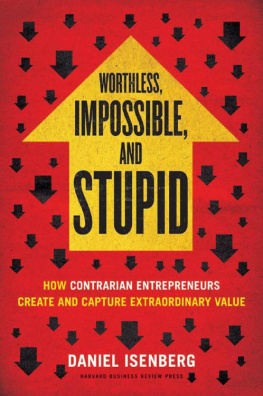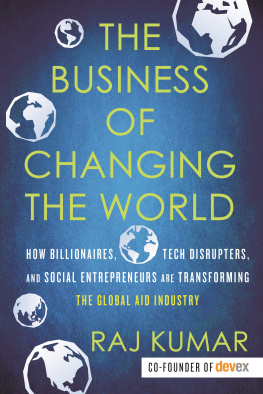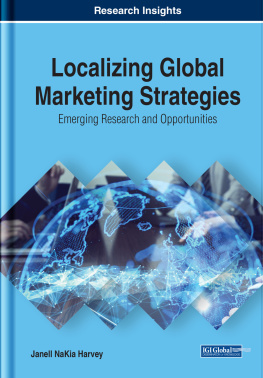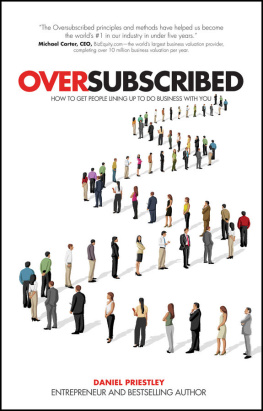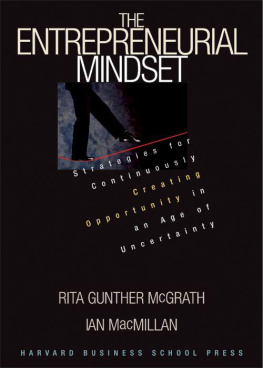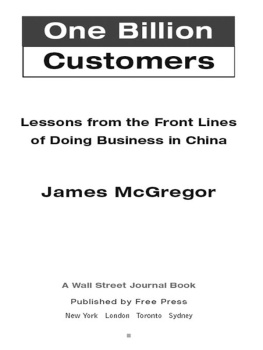PRAISE FOR WORTHLESS, IMPOSSIBLE, AND STUPID
In this provocative book, Daniel Isenberg shatters stereotypes and clarifies the often misunderstood concept of entrepreneurship. His inspiring real-life examples prove that true value is often found where many can only see something that seems worthless, impossible, or stupid.
Akin ngr, former CEO, Garanti Bank
Valuable, practical, and insightful, Daniel Isenbergs new book is a very helpful and illustrative guide to the entrepreneurial journey.
Sir Ronald Cohen, cofounder and former Chairman, Apax Partners
Entrepreneurship is so important for a healthy economy: It creates jobs, supports communities, and builds a better working world. Worthless, Impossible, and Stupid provides a sophisticated and provocative narrative on this crucial topic.
Maria Pinelli, Global Vice Chair of Strategic Growth Markets, Ernst & Young
Daniel Isenbergs bottom-up insights are a must-read for policymakers around the world racing to build smarter environments for starting and scaling firms.
Jonathan Ortmans, President, Global Entrepreneurship Week, and Senior Fellow, Ewing Marion Kauffman Foundation
Entrepreneurs take note. Daniel Isenberg makes his contrarian point clear in this provocative book: Entrepreneurs need to be as innovative in finding ways to capture value as they are in creating it. This will be good for them individually and for the society that benefits from entrepreneurialism.
Nick Lazaris, former CEO, Keurig
Daniel Isenberg brings us back to the roots of entrepreneurship: Its all about identifying, creating, and capturing value, in areas not seen by others and that may seem worthless, impossible, and stupid. But there are real rewards for the hard-headed entrepreneurand for the rest of us!
Mikko Kosonen, President, the Finnish innovation fund Sitra
Worthless, Impossible, and Stupid is a thought-provoking book for anyone interested in understanding the deeply contrarian nature of many entrepreneurs. It challenges the status quo definitions of entrepreneurship with substantive examples from all over the world. A must-read for building start-up communities.
Brad Feld, Managing Director, Foundry Group; cofounder, TechStars; and author, Startup Communities: Building an Entrepreneurial Ecosystem in Your City
WORTHLESS, IMPOSSIBLE, AND STUPID
WORTHLESS, IMPOSSIBLE, AND STUPID
HOW CONTRARIAN ENTREPRENEURS CREATE AND CAPTURE EXTRAORDINARY VALUE
DANIEL ISENBERG
with Karen Dillon
HARVARD BUSINESS REVIEW PRESS
BOSTON, MASSACHUSETTS
Copyright 2013 Daniel Isenberg
All rights reserved
Printed in the United States of America
10 9 8 7 6 5 4 3 2 1
No part of this publication may be reproduced, stored in or introduced into a retrieval system, or transmitted, in any form, or by any means (electronic, mechanical, photocopying, recording, or otherwise), without the prior permission of the publisher. Requests for permission should be directed to , or mailed to Permissions, Harvard Business School Publishing, 60 Harvard Way, Boston, Massachusetts 02163.
The web addresses referenced in this book were live and correct at the time of the books publication but may be subject to change.
Library of Congress Cataloging-in-Publication Data
Isenberg, Daniel J.
Worthless, impossible, and stupid : how contrarian entrepreneurs create and capture extraordinary value / Daniel Isenberg.
pages cm
ISBN 978-1-4221-8698-5 (alk. paper)
1. Entrepreneurship. 2. Value. 3. Creative ability in business. I. Title.
HB615.I744 2013
658.421dc23
2012047093
ISBN: 9781422186985
eISBN: 9781422186992
The paper used in this publication meets the requirements of the American National Standard for Permanence of Paper for Publications and Documents in Libraries and Archives Z39.48-1992.
CONTENTS
)
PREFACE
WHY YOU ARE READING THIS BOOK
The buzz of entrepreneurship is all around us these days. High-profile start-up movements have launched in dozens of countries. Social media companies are sprouting from nowhere to impactor impinge on, depending on your perspectiveour personal and professional lives. Millions of people in dozens of countries are participating in celebrations such as Global Entrepreneurship Week. Each summer in the United States, tens of thousands of schoolkids take part in Lemonade Days, a program organized to teach the kids how to do business. In almost every nation on every continent, presidents and prime ministers have the word entrepreneurship on their lips, usually in the same breath as job creation .
What does this mean for you and me? At home, entrepreneurship touches many of us even more directly: maybe you yourself have started a venture or worked for someone who did. Maybe, instead of continuing to work for your current employer, you have the urge to take that great idea your boss trashed and try to bring it to market yourself. Perhaps, ignoring the advice of family and friends, you want to attack some frustrating need, solve a big problem, or build a brand-new product that no one had the sense to have made and sold already. Maybe you and a college mate have a zany idea that has grown on you, and you cant wait to get working on it. Or you have a relative who went out and took over a ragged little business that the owners or banks had written off as hopeless, and is growing it. Or you might just be reading these words during a rare break from eighteen-hour days, getting your own nascent venture off the ground, dealing with the tough bloody sh*t that you will read about later in this book.
With certainty, none of these ventures has been, or will be a cakewalk. Spouses are naturally worried about the fallout at home in case you fail. Customers are few and hard to convert into sales. Investors are picky and wont return phone calls or e-mails. Getting a ready-for-prime-time product to market takes more sleepless nights than you had imagined, making this the best year of your life at the same time that it is your worst.
Why is that? The main reason is that you are swimming against the markets existing current, going against the grain. All entrepreneurs do that. If that were not the case, it would not be entrepreneurship. Because if you or your friends are entrepreneurs, you are doing something novel, bringing to the market a product or service that doesnt exist yet, except perhaps in your minds eye. You are trying to tell people that what they are currently doing or buying is not good enough, that they need to change their behavior and pay you in order to make their lives better. That means you will almost surely be butting up against anything from apathy to scorn. But if you succeed in scaling that wall of resistance, you will have proven that that new product or service has value.
In Worthless, Impossible, and Stupid , you will learn that this adverse process is the norm for entrepreneurship, not the exception. It is a contrarian process that repeats itself in one form or another countless times a day all over the world. Its ubiquity underlies a key question at the heart of this book: how do people with contrarian ideas succeed in creating and capturing value that is extraordinary? And is it somehow possible that more of us are capable of this than we think?
Worthless is about how so many people from all around the world see hidden value in situations where others do not. These people then use that perception to successfully develop valuable products and services that customers usually initially dont think they want, and ultimately go on to realize extraordinary value for themselves.
I have seen this kind of entrepreneurship in every one of the forty-five countries I have visited or worked in. I have come to believe that entrepreneurship is part of the human experience, like art, music, theater, and literature. Although it may be statistically unusual (like the statistical rarity of the good artist), entrepreneurship can and does occur in virtually every society, not just the mythical hot spots (e.g., Silicon Valley).
Next page
